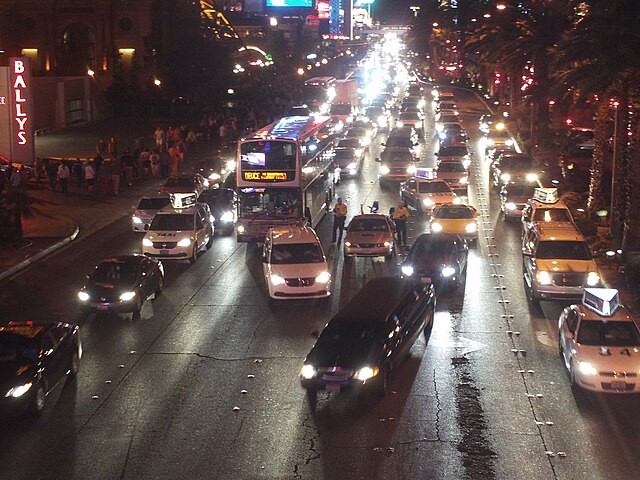Law Enforcement Leaders Unite Against Weak Traffic Laws
Picture this: You’re driving to work and someone blows past you going 29 miles per hour over the speed limit. Under Nevada’s current law, that driver faces nothing more than a civil fine – like getting a parking ticket. No criminal record. No real consequences. No reason to slow down.
This is the reality that both Clark County District Attorney Steve Wolfson and Governor Joe Lombardo are fighting against. Now, with Lombardo’s promised special session on crime coming up, there’s finally hope for fixing this dangerous mistake.
What Changed and Why It Matters
Back in January 2023, Assembly Bill 116 fundamentally changed how Nevada handles speeding tickets. The law, passed by the previous legislature under Governor Steve Sisolak, turned most traffic violations from criminal misdemeanors into civil infractions. That means if you’re caught speeding less than 30 miles per hour over the limit, you’re looking at a fine, not a criminal charge.
“My prosecutors’ hands are tied on these speeders because so many of these violations are only civil infractions, which my office doesn’t get involved with by law,” Wolfson explained. His office can only prosecute when drivers exceed the speed limit by 31 mph or more.
Think about that for a moment. Someone can drive 85 mph in a 55 mph zone – that’s 30 mph over – and face zero criminal consequences. It’s essentially a permission slip for reckless driving.
The Conservative Case Against Soft Traffic Laws
For conservatives who believe in law and order, this represents everything wrong with the “decriminalization” movement. When you remove real consequences for breaking the law, you get more lawbreaking. It’s that simple.
“We need to be deterred from doing things, and one of the ways we deter people is to punish them,” Wolfson said, echoing what most conservatives have been saying all along.
The numbers tell a troubling story. The Nevada Office of Traffic Safety’s 2024 annual report shows that “risk-taking driving behaviors such as speeding” continue to rise. While supporters of AB 116 claim it helps people avoid criminal records for minor offenses, critics point out it’s made our roads more dangerous.
Enter Governor Lombardo’s Crime Bill
This is where things get interesting. Governor Lombardo has announced he’ll call a special session in the coming months to “finish what the Legislature left unfinished.” His crime bill, which died in the chaotic final hours of the regular session, takes a completely different approach than AB 116.
The governor’s Safe Streets and Neighborhoods Act would increase penalties for repeat offenders, lower the amount of fentanyl someone can possess to charge them with a felony, and lower the theft threshold required to charge someone with a felony from $1,200 to $750. It’s about putting teeth back into Nevada’s laws – exactly what Wolfson says we need for traffic violations too.
“This legislation was drafted to put teeth back into Nevada’s penal code, hold criminals accountable, empower judges and prosecutors and support victims of crime,” Lombardo said when unveiling his crime bill.
The Liberal Opposition
Of course, the ACLU and progressive groups oppose tougher penalties. ACLU of Nevada Executive Director Athar Haseebullah called the governor’s crime bill a “relic-of-the-past” and complained about costs. They argue that criminal penalties for traffic violations unfairly impact poor people who can’t pay fines.
But here’s what they don’t mention: before AB 116, Nevada managed just fine with criminal penalties for speeding. Most states still have them. The average person understands that if you break the law, there should be consequences beyond just a fine.
What Needs to Happen
Wolfson has the right idea. He’s suggested creating a specialty traffic court for misdemeanor speeding cases or:
“Revisiting the law to make certain speeding offenses criminal once again.”
“In my opinion, we need to go back and make even these minor speeding violations misdemeanors and focus on the speeders,” Wolfson said.
“Whether we need increased penalties or more traffic commissioners, another couple of judges, we need to do something.”
When Governor Lombardo calls his special session, lawmakers should add traffic law reform to the agenda. If the governor is serious about his promise to restore law and order – and his track record as former Clark County Sheriff suggests he is – then fixing this soft-on-crime traffic law should be a priority.
What You Can Do
Contact your state legislators now, before the special session. Tell them you want real consequences for dangerous driving, not slap-on-the-wrist civil fines. Remind them that public safety isn’t about making life easier for lawbreakers – it’s about protecting law-abiding citizens.
Governor Lombardo ran on a law-and-order platform. Now it’s time to deliver on that promise, and that includes making our roads safer by restoring meaningful penalties for speeding.
The choice is clear: We can have Nevada’s roads governed by real laws with real consequences, or we can continue down the path of decriminalization that puts all of us at risk. For conservatives who believe in limited government but strong law enforcement, the answer should be obvious.
The opinions expressed by contributors are their own and do not necessarily represent the views of Nevada News & Views. This article was written with the assistance of AI. Please verify information and consult additional sources as needed.



